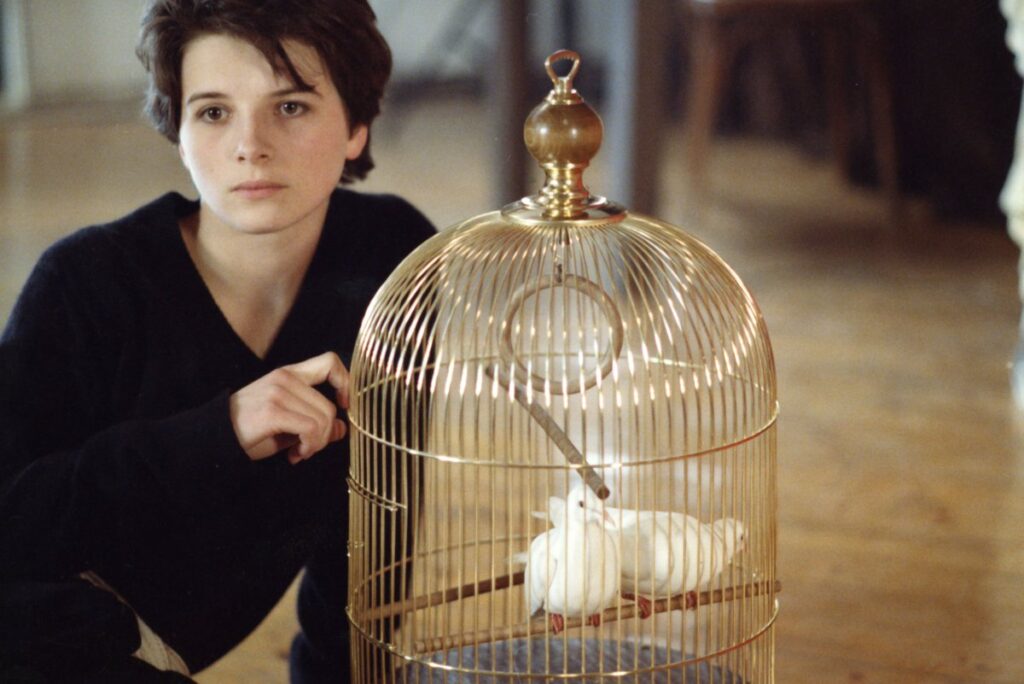
Rendez-vous (1986) is relatively early in both Juliette Binoche and Andre Téchiné’s careers. Binoche had yet to develop the kind of kinetic energy she would while working with Leos Carax (another favorite filmmaker of mine) while Téchiné is in transition between the more formal approaches exhibited in his films The Bronte Sisters and Hotel America and the visual stylization and cinematic improvisation of I Don’t Kiss. I could go on and on about the aesthetics of Rendez-vous but I won’t since I have written about this film three times already for this very blog! What I am willing to elaborate on is how Rendez-vous taught me a very valuable lesson.
Unlike most reflexive narrative films Rendez-vous is less concerned with its commentaries on the cinema and more concerned with the lives and world of its characters. This gives the film a density, a sophistication. The revelations concerning the very notions of cinematic performance within the film are tucked beneath the surface of the drama. This opens Rendez-vous up for multiple viewings very easily. For the combinations of dramatically diegetic and the abstract reflexive components of the film are layered so densely that the dialogue they create feels different during any and every viewing.
Nina (Juliette Binoche) is a struggling actress who has migrated from the French countryside to Paris in search of a fruitful career. Penniless, Nina exploits a pair of flat mates to put a roof over her head. Nina is a prude at first, and refuses to sleep with either man. Paulot (Wadeck Stanczak) becomes drawn to her, a sort of casual crush. His desires match hers at the beginning of the film, each idolizing a naively romantic notion of true love. Shortly, Nina has obtained a walk on part in a low rent theater production. This is where her real growth begins as producers, directors, and cast-mates express their expectancy of sexual favors in return for career-oriented aid. Paulot remains unchanged, making every feeble attempt to sway Nina into caring about him.
Quentin (Lambert Wilson), Paulot’s flat mate, works in a live sex show, and was once an esteemed actor who appeared in an ill fated theater production of Romeo & Juliette. He too attends one of Nina’s shows and afterwards escorts her to his own show. Shortly thereafter, Quentin seduces Nina. The following morning, there is a fight between the roommates, from which Quentin storms off only to be struck dead by a passing car. This catastrophic event shatters Nina.
Nina is the younger version of Chloe (Zou Zou) that we only hear about in Rohmer’s Love In The Afternoon (1972). Both women have become undone through their misplaced love and naïve understandings of adult affairs. They believe, at the climax of both films, that redemption lies in the arms of a former lover. Chloe attempts to seduce the married Frederic (Bernard Verley) who has managed to secure his youthful innocence in a happy marriage. Likewise, Nina returns to her former flame Paulot and seduces him. Where Frederic rejects Chloe, Paulot accepts Nina. Perhaps because of his youth, Paulot is unable to comprehend the ramifications of his decision as Frederic had. Nina’s seduction of Paulot only corrupts him as Quentin had awakened her.
Téchiné, like every filmmaker of his generation, has been heavily influenced by the essay films of Jean-Luc Godard. Téchiné implements this influence with a natural fluidity, structuring an analysis of performance in film around Nina’s preparations to appear in a revival production of Romeo & Juliette, with the same director (Scrutzler as played by Jean-Louis Tritignant) who worked on Quentin’s production. Through out the third act of Rendez-Vous, Nina and Scrutzler debate and discuss that which makes an actress great. Téchiné fully intends his audience to understand that it is actress Binoche playing actress Nina who is discussing her performance as Shakespeare’s Juliette. Téchiné is working with the same mechanisms that Godard employed in Contempt when he cast Fritz Lang. This self-awareness and Téchiné’s willingness to address it shows a marked difference between himself and Rohmer.
I bought this film on DVD many years ago when I was at the Princeton Record exchange with my friend Josh. There were three reasons for my purchase. The first is that Josh and I both love the Princeton Record Exchange and support small businesses. The second reason is that I had always wanted to see an André Téchiné film. I had read about him and read about him in numerous books at my college library but had not seen one of his films (I’ve seen ten of them now and they are all excellent). The final motivating factor was that Rendez-vous stars Juliette Binoche. Binoche’s performances are always revealing and captivating; I will at least see any of the films she is in once because it is absolutely worth it.
